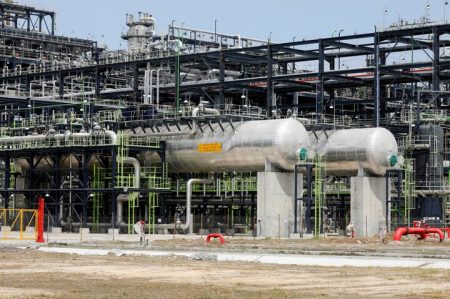 16 December 2011, Vanguard Newspaper VIEWPOINT, LAGOS – Sometimes one is tempted to jump to the conclusion that the average Nigerian is eternally and irrationally afraid of change even when that promises an outcome that is in his best interest. Indeed there are several unfolding pointers in the polity today to buttress this impression.
16 December 2011, Vanguard Newspaper VIEWPOINT, LAGOS – Sometimes one is tempted to jump to the conclusion that the average Nigerian is eternally and irrationally afraid of change even when that promises an outcome that is in his best interest. Indeed there are several unfolding pointers in the polity today to buttress this impression.
Having witnessed several developments over the years, one is certainly in a position to note the confounding penchant of Nigerians to rise in opposition to particular government act ions or policies without making any genuine attempt to understand the considerations that informed such decisions by government.
Not for them the objective appreciation of the positive impact that a faithful implementation of such policy decision or action will have on the polity. And that is because more often than not the chorus of opposition to government’s planned action is usually instigated by individuals or groups with selfish motives or who have an axe to grind with government or its officials over political differences. They are experts at manipulating uninformed or gullible members of the public to see every decision or action taken by government as being against their interest.
The recent decision by the Federal Government to fully deregulate the down stream sector of the petroleum industry is one such issue that has continued to generate a lot of heat and passion bordering on opposition on the part of the uninformed, and objective appraisal of government’s intention on the part of those who are concerned about the intended benefits rather than blind condemnation.
The argument of those opposed to a full deregulation of the petroleum sector is that it will lead to increases in the pump prices of fuel which will in turn trigger off structural inflation with its negative multiplier effects in the fragile Nigerian economy.
But this is an argument based on fear and ignorance. One thing is sure, the Federal Government headed by President Goodluck Jonathan has not by action or inaction given the impression that it is anti-people or anti-masses as the critics will put it.
Government has always sounded it loud and clear that it is committed to boldly tackling the challenges confronting the c
ountry and enhancing the well-being of the people.
The question is why would a government that has consistently expressed concern about the problems in the country and has vowed to address same, now want to unleash more suffering on the people whose interests it has pledged to safeguard? The fact is that fuel subsidy withdrawal did not originate from the present administration. It has always featured in the economic calculations of successive administrations over the years. And this tells a story of its own. What this implies is that subsidy withdrawal is an economic policy imperative which past governments either half-heartedly addressed and abandoned midway due to sustained opposition pressures from certain quarters or ignored due to populist consideration.
But it is a reality that the Jonathan administration finds difficult to ignore because of the President’s avowed commitment to squarely addressing the lingering economic challenges that have been the bane of the country’s growth and development.
This is so because it has been found that the prevailing subsidy regime which sustains fixed prices of petroleum products continues to exact a huge burden on the economy, thereby making planning and development almost impossible.
There are several other unsavoury consequences of maintaining or continuing with fuel subsidies. One of these derives from the fact that a vast majority of the people who are in the lower income bracket do not benefit from this arrangement contrary to the postulation of those who argue for its retention.
It is said that subsidy level is directly related with household income as richer households consume larger quantities of petroleum products and consequently enjoy all the benefits.
One other fact worth noting is that the administration of subsidy is beset with inefficiencies, leakages and corruption as it has resulted in the diversion of scarce public resources away from investment in critical infrastructure, while putting pressure on government resources
That is not all. It has also discouraged competition and stifled private investment in the downstream sector. Due to lack of deregulation, investors have shied away from investment in the development of refineries, petrochemicals, fertilizer plants, etc.
Huge price disparity has encouraged smuggling of petroleum products across the borders to neighbouring countries, where prices are much higher. Nigeria therefore ends up subsidising consumption of petroleum products in neighbouring countries.
By contrast, the deregulation of the downstream sector of the petroleum industry is expected to lead to rapid private sector investment in refineries and petrochemicals, which will generate millions of jobs and lead to increased prosperity for a vast majority of Nigerians.
This will be unlike what obtains presently where the benefits of the so-called subsidies have not been felt in the critical sectors of the economy. Another important consideration worth noting is that since the year 2000, the government has issued 20 licenses for new refineries but these have not resulted in construction of new refineries.
The Jonathan-led government is of the conviction that the discontinuation of the current fuel subsidy scheme will save additional resources for investing in programmes targeted at mitigating poverty and spurring economic growth.
And that is why it has expressed the commitment at setting up a mechanism to ensure that the additional resources realised from fuel subsidy removal are channeled into high impact and visible programmes that will benefit all Nigerians, especially the poor and most vulnerable in the country.
Government standard response to criticisms that the planned petroleum subsidy withdrawal will worsen the plight of the poor has been that it is putting in place a well targeted safety net programmes which if allowed to be implemented will certainly have desired positive impact on the people as was the case with countries like Indonesia, Brazil and Iran which introduced and succeeded with same.
This is anchored on what has come to be known as the Subsidy Reinvestment and Empowerment Programme (SURE). The idea behind this, it has been revealed, is to mitigate the immediate impact of the petroleum subsidy withdrawal on majority of Nigerians, especially the poor and vulnerable segments.
It is also to accelerate economic transformation through investments in critical infrastructure projects, so as to drive economic growth and achieve the Vision 20:2020. And also importantly, it is intended to lay a foundation for the successful development of a national safety net programme that is better targeted at the poor and most vulnerable on a continuous basis, according to government officials.
Looking at the outline of the social safety net programmes being put in place one cannot help but acknowledge that government has no intention to leave the population in the lurch through the petroleum subsidy discontinuation.
This is because the programmes cover maternal and child health services, public works/women and youth empowerment programme, urban mass transit scheme, vocational training schemes, Niger Delta development projects, road infrastructure projects, rail transport projects, water and agriculture projects, irrigation projects, rural and urban water projects, and so on.
*Mr. Ugo, a public affairs analyst, wrote from Lagos.



